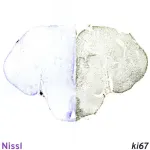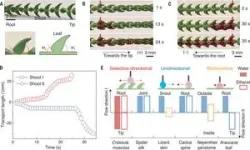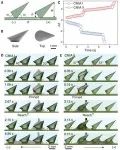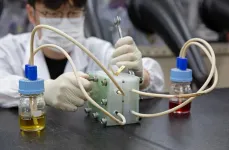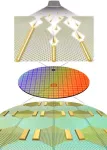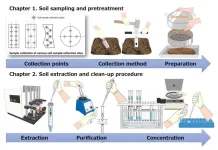(Press-News.org) New research reveals that pregnancy-related brain impairment is present in live-bearing fish, but instead of affecting learning and memory as expected from similar research on mammals, it appears to have a stronger impact on decision-making and sensory reception.
There have been many studies into the detrimental impact of pregnancy on mammalian brains, sometimes called “baby brain” or “momnesia” in humans, revealing how the disruption of neurological processes like neurogenesis, or the creation of new neurons, can affect learning and memory - but this is the first study to examine this phenomenon in fish.
While most fish reproduce by laying eggs, some species are live-bearing, or viviparous, and carry their offspring internally before producing live young. Viviparous species include popular aquarium fish from the family Poeciliidae, such as guppy, molly and platy.
“We wanted to see if these pregnancy-related changes in cognition and neurogenesis occur in other live-bearing evolutionary lineages, particularly in a species which lacks a placenta,” says Tiffany Ernst, a PhD candidate in the field of developmental and reproductive biology at Wageningen University, Netherlands. “In mammals, the placenta is thought to help regulate pregnancy-related changes to the mother’s brain.”
“The species of fish that I work with, Poeciliopsis gracilis, is especially interesting as they are superfetatious, meaning they can be pregnant with multiple temporally overlapping broods of offspring simultaneously,” says Ms Ernst. “Essentially, my fish are almost constantly pregnant in adulthood - so any detrimental impact on cognition might be more evident in this species.”
“We hoped to learn how pregnancy might induce changes to the maternal brain in a non-mammalian live-bearing species,” says Ms Ernst. “This could help us to understand whether the evolution of a live-bearing reproductive strategy requires neurological trade-offs to adequately adapt for a healthy pregnancy.”
To examine the impact of pregnancy on cognition, pregnant and virgin fish were trained to associate a green disk with the location of food, and then perform a spatial learning task when presented with two seemingly identical disks in different locations. “Then we tested their cognitive flexibility by swapping the locations of the rewarded and non-rewarded disks to see how the fish adjusted to the new location of the food reward,” says Ms Ernst.
To assess the effect on fish neurology, Ms Ernst and the team removed the brains of the pregnant and virgin females and used cell staining to identify areas of new cell proliferation - an indicator of which areas of the brain were producing new cells. This study is the first to map the areas of brain cell proliferation in this species in a “brain atlas”.
Ms Ernst and her team found that while both pregnant and virgin fish were equally successful in both cognitive tasks, pregnant fish were much more hesitant when choosing which disk to approach.
“We also found no difference in cell proliferation in the regions of the brain most responsible for learning and memory,” says Ms Ernst. “However, we were surprised to see that pregnant females exhibited decreased cell proliferation in the regions which contribute to maternal olfactory reception.”
This surprising result suggests that pregnancy compromises the fish’s ability to interpret scent in the water, which may contribute to their choice-aversion in the cognitive tests. “For P. gracilis, reduced choice-propensity during pregnancy might be an adaptive strategy wherein females do not take the risk of foraging for food when the reward is not guaranteed, thus conserving energy for reproduction,” says Ms Ernst.
“Our research indicates that pregnancy may impact maternal cognition and alters brain cell proliferation, but not in the same ways as we would expect from mammals,” says Ms Ernst. “This implies that pregnancy across different evolutionary lineages has an impact on the maternal brain which in turn, affects how mothers cognitively and physiologically adapt to the burdens of live-bearing reproduction.”
This research is being presented at the Society for Experimental Biology Annual Conference in Prague on the 2-5 th July 2024.
END
Pregnant fish can also get “baby brain”, but not the way that mammals do
2024-07-03
ELSE PRESS RELEASES FROM THIS DATE:
Pasteurization inactivates highly infectious avian flu in milk
2024-07-03
Highlights:
• In late March 2024, H5N1 bird flu was detected in dairy cattle and then in raw milk.
• Researchers tested hundreds of milk products from dozens of states for the virus.
• No infectious virus was found in pasteurized milk products.
• Non-infectious traces of viral genetic material were found in 20% of samples.
Washington, D.C.—In March 2024, dairy cows in Texas were found to be infected with highly pathogenic avian flu, ...
KIER develops 'viologen redox flow battery' to replace vanadium’
2024-07-03
A technology has been developed to replace the active material in large-capacity ESS 'redox flow batteries' with a more affordable substance.
*Redox Flow Battery: A term synthesized from Reduction, Oxidation, and Flow. It is a battery that stores electrical energy as chemical energy through oxidation and reduction reactions of active materials in the electrolyte at the electrode surface and converts it back to electrical energy when needed. It is capable of large-scale storage, can be used long-term through periodic replacement of the electrolyte, and its major advantage is the absence of fire risk.
Dr. Seunghae Hwang’s ...
Chemists synthesize an improved building block for medicines
2024-07-03
Chemists have overcome a major hurdle in synthesizing a more stable form of heterocycle—a family of organic compounds that are a common component of most modern pharmaceuticals.
The research, which could expand the toolkit available to drug developers in improving the safety profiles of medications and reducing side effects, was published in Science by organic chemists at the University of British Columbia (UBC), the Massachusetts Institute of Technology (MIT), and the University of Michigan.
“Azetidines ...
A genetic algorithm for phononic crystals
2024-07-03
Tokyo, Japan – The advent of quantum computers promises to revolutionize computing by solving complex problems exponentially more rapidly than classical computers. However, today's quantum computers face challenges such as maintaining stability and transporting quantum information. Phonons, which are quantized vibrations in periodic lattices, offer new ways to improve these systems by enhancing qubit interactions and providing more reliable information conversion. Phonons also facilitate better communication ...
Machine learning could aid efforts to answer long-standing astrophysical questions
2024-07-03
In an ongoing game of cosmic hide and seek, scientists have a new tool that may give them an edge. Physicists at the U.S. Department of Energy’s (DOE) Princeton Plasma Physics Laboratory (PPPL) have developed a computer program incorporating machine learning that could help identify blobs of plasma in outer space known as plasmoids. In a novel twist, the program has been trained using simulated data.
The program will sift through reams of data gathered by spacecraft in the magnetosphere, the region of outer space strongly affected by Earth’s ...
Research spotlight: Uncovering how a cellular miscommunication leads to cognitive impairment in female patients with Alzheimer’s disease
2024-07-03
Lead author Neta Rosenzweig, PhD, of the Ann Romney Center for Neurological Diseases, and senior author Oleg Butovsky, PhD, of the Ann Romney Center and Gene Lay Institute of Immunology and Inflammation, share key messages from their paper “Sex-Dependent APOE4 Neutrophil-Microglia Interactions Drive Cognitive Impairment in Alzheimer’s Disease” published in Nature Medicine.
How would you summarize your study for a lay audience?
In this manuscript, we identify that a major genetic risk ...
AI model to improve patient response to cancer therapy
2024-07-03
A new artificial intelligence (AI) tool that can help to select the most suitable treatment for cancer patients has been developed by researchers at The Australian National University (ANU).
DeepPT, developed in collaboration with scientists at the National Cancer Institute in America and pharmaceutical company Pangea Biomed, works by predicting a patient’s messenger RNA (mRNA) profile. This mRNA - essential for protein production - is also the key molecular information for personalised cancer medicine.
According to lead author Dr Danh-Tai Hoang from ANU, when combined with a second tool called ENLIGHT, DeepPT ...
Scientists discover way to “grow” sub-nanometer sized transistors
2024-07-03
A research team led by Director JO Moon-Ho of the Center for Van der Waals Quantum Solids within the Institute for Basic Science (IBS) has implemented a novel method to achieve epitaxial growth of 1D metallic materials with a width of less than 1 nm. The group applied this process to develop a new structure for 2D semiconductor logic circuits. Notably, they used the 1D metals as a gate electrode of the ultra-miniaturized transistor.
Integrated devices based on two-dimensional (2D) semiconductors, which exhibit excellent properties even at the ultimate limit of material thickness down to the atomic ...
Bath student wins national award for computer game that explores mental health
2024-07-03
A final year computer science undergraduate from the University of Bath has been named amongst the UK’s best student game developers, having won an award in the “Games with purpose” category at the Games Innovation Challenge 2024.
Salmaan Zhang competed against university and college students from across the country to win one of seven categories in the competition, which is sponsored by UNiDAYS and delivered by NSE (National Student Esports).
The challenge asked students in the UK to create the most innovative game in just eight weeks. Submitted entries were shortlisted and then judged by industry experts in several ...
NARO developed a novel method to analyze “forever chemicals” in the soil
2024-07-03
Concern about the effects of PFAS are of increasing globally. Also there is no accurate method for analyzing multiple PFAS in soil. Hence, a team of PFAS researchers led by NARO et.al sought to develop a stable and accurate method for analyzing multicomponent PFAS in the soil (Ministry of Agriculture, Forestry and Fisheries -MAFF project).
Unlike the PFAS analysis method for water samples, it is difficult to ensure the extraction efficiency of the target PFAS in diverse soil samples. In Japan, there are 381 soil types, with volcanic ash soils being the predominant. Since these soils possess high carbon content, ...
